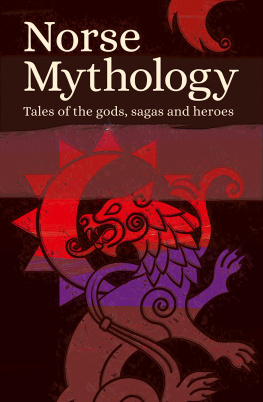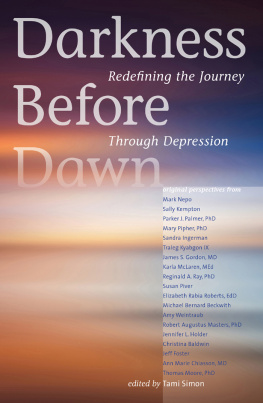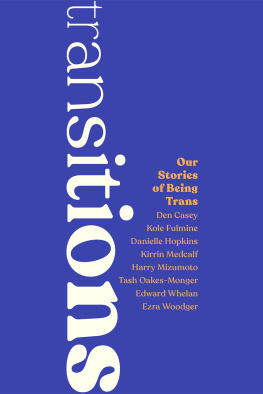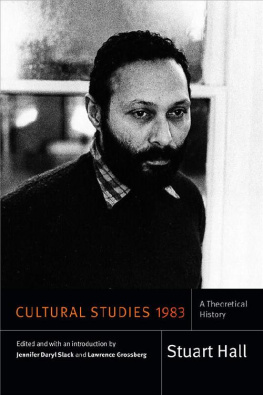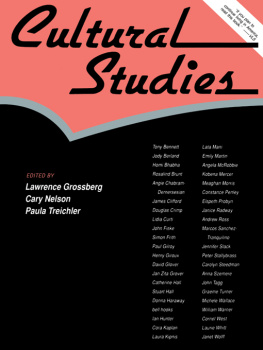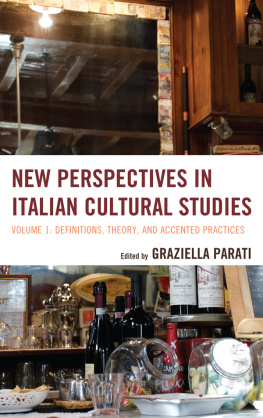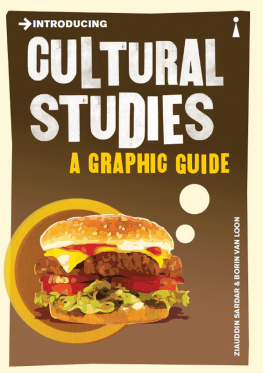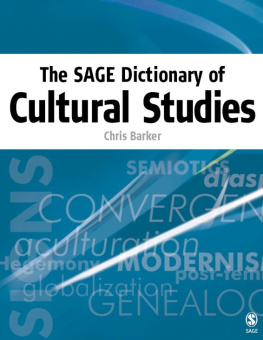First published 2004 by Routledge
2 Park Square, Milton Park,Abingdon, Oxon OX14 4RN
605 Third Avenue, New York, NY 10017
Routledge is an imprint of the Taylor & Francis Group, an informa business
Copyright 2004 Taylor & Francis
All rights reserved. No part of this book may be reprinted or reproduced or utilised in any form or by any electronic, mechanical, or other means, now known or hereafter invented, including photocopying and recording, or in any information storage or retrieval system, without permission in writing from the publishers.
Notice:
Product or corporate names may be trademarks or registered trademarks, and are used only for identification and explanation without intent to infringe.
The print edition of this journal is typeset by Type Study
ISBN 13: 978-0-415-34732-7 (pbk)
ISSN 0950-2386
DOI: 10.4324/9781003209324
Editorial Statement
Cultural Studies continues to expand and flourish, in large part because the field keeps changing. Cultural studies scholars are addressing new questions and discourses, continuing to debate long-standing issues, and reinventing critical traditions. More and more universities have some formal cultural studies presence; the number of books and journals in the field is rapidly increasing. Cultural Studies welcomes these developments. We understand the expansion, reflexivity and internal critique of cultural studies to be both signs of its vitality and signature components of its status as a field. At the same time, cultural studies has been and will no doubt continue to be the subject of numerous attacks, launched from various perspectives and sites. These have to be taken seriously and answered, intellectually, institutionally and publicly. Cultural Studies hopes to provide a forum for response and strategic discussion.
Cultural Studies assumes that the knowledge formations that make up the field are as historically and geographically contingent as are the determinations of any cultural practice or configuration and that the work produced within or at its permeable boundaries will be diverse. We hope not only to represent but to enhance this diversity. Consequently, we encourage submissions from various disciplinary, theoretical and geographical perspectives, and hope to reflect the wide-ranging articulations, both global and local, among historical, political, economic, cultural and everyday discourses. At the heart of these articulations are questions of community, identity, agency and change.
We expect to publish work that is politically and strategically driven, empirically grounded, theoretically sophisticated, contextually defined and reflexive about its status, however critical, within the range of cultural studies. Cultural Studies is about theorizing politics and politicizing theory. How this is to be accomplished in any context remains, however, open to rigorous enquiry. As we look towards the future of the field and the journal, it is this enquiry that we especially hope to support.
Lawrence Grossberg
Della Pollock
January 1998
Contributions should be sent to Professors Lawrence Grossberg and Della Pollock, Dept, of Communication Studies, CB #3285, 113 Bingham Hall, The University of North Carolina at Chapel Hill, Chapel Hill, NC 27599-3285, USA. They should be in triplicate and should conform to the reference system set out in the Notes for Contributors. An abstract of up to 300 words (including 6 keywords) should be included for purposes of review. Submissions undergo blind peer review. Therefore, the authors name, address and e-mail should appear only on a detachable cover page and not anywhere else on the manuscript. Every effort will be made to complete the review process within six months of submission. A disk version of the manuscript must be provided in the appropriate software form at upon acceptance for publication.
Reviews, and books for review, should be sent to:
- Stuart Price
- School of Arts
- de Montfort University
- The Gateway
- Leicester LEI 9BH
- UK
- poumista@hotmail.com
- Gil Rodman
- Department of Communication
- University of South Florida
- 4202 East Fowler Avenue, CIS 1040
- Tampa
- FL 33620 7800
- USA
- grodman@chuma.cas.usf.edu
- Alvaro Pina
- Rua Jose P. Chaves
- 6-3 Dto
- 1500-377 Lisboa
- Portugal
- ferpi@mail.telepac.pt
- Ien Ang
- Institute for Cultural Research
- University of Western Sydney
- Parramatta Campus
- BCRI Building L2
- Locked Bag 1797
- Penrith South DC NSW 1797
- Australia
- I.Ang@uws.edu.au
Contents
VOLUME 18 NUMBER 1 JANUARY 2004
Articles
Catherine Nash
Scott Wible
Katrien Jacobs
Sujeong Kim
David W. Park
- Media Advocates, Latino Citizens and Niche Cable: the Limits of No Limitstv
- Pornography in Small Places and Other Spaces
- Rereading David Morleys the Nationwide Audience
- The Couch and the Clinic: the Cultural Authority of Popular Psychiatry and Psychoanalysis
- Notes on contributors
- Notes for contributors
Guide
- Notes on contributors
- Notes for contributors
Catherine Nash
GENETIC KINSHIP
DOI: 10.4324/9781003209324-1
The recent marketing of new genetic tests for popular genealogy is one significant interface between the science of new genetics and public culture in the West. These new commodities offer to situate individuals within global patterns of human genetic diversity; locate genetic origins and sort out true biological relatedness from practised kinship. Taking two cases of recent attempts to popularize genetic tests in popular genealogy, this paper considers how ideas of gender, reproduction, nation, race and relatedness are being shaped by and deployed within their discourses of genetic kinship. In these efforts to geneticize genealogy, the idiom of kinship and the gendering of narratives of reproduction and descent are used to make these tests meaningful and to distance them from ideas of race and ethnicity. Discourses of family relatedness provide a grammar for translating the complexities of new genetics into public culture. At the same time, geneticized genealogy produces new versions of genetic kinship, in the form of Y-chromosome genetic brotherhood, Mitochondrial DNA clan membership and global genetic kinship. Yet, notions of genetic kinship also provide cultural resources for the making of personal and collective identities in a myriad of ways and with diverse implications for the politics of race and national belonging.
KEYWORDS: genetics, genealogy, ethnicity, race, gender, origins
Theres DNA and there are probabilities of sharing some, but no tangible genetic stuff divisible among kin and distinguishing or bounding them from non-kin. There is no genetic test for kinship Kinship is not a genetic property.
(Marks 2002, p. 251)
Introduction
The corporate logo that features on the website of Relative Genetics, a company offering genetic tests for reconstructing global and family genealogies, twins two key icons of Western culture; the roots and branches of the family tree and the double helix of molecular genetics. This is one of several companies in the USA and UK eager to build on the market for genetic paternity tests and the popularity of genealogy to create consumer interest in new genetic products that purport to answer questions about immediate, historic and prehistoric relatedness and geographical origins. The findings of population geneticists tracing the history and geography of the origins, movement and interactions of prehistoric populations are being converted into genetic commodities that offer to situate individuals within global patterns of human genetic diversity as well as sort out true biological relatedness from practised kinship. Potential customers of Family Genetics can buy genetic testing kits to establish biological relatedness amongst known or suspected relatives, or can send DNA samples that can be analysed to locate them within the community of the worlds largest genetically based genealogy database. As Haraway observes: Epistemophilia, the lusty search for knowledge of origins, is everywhere (1997, p. 255).



